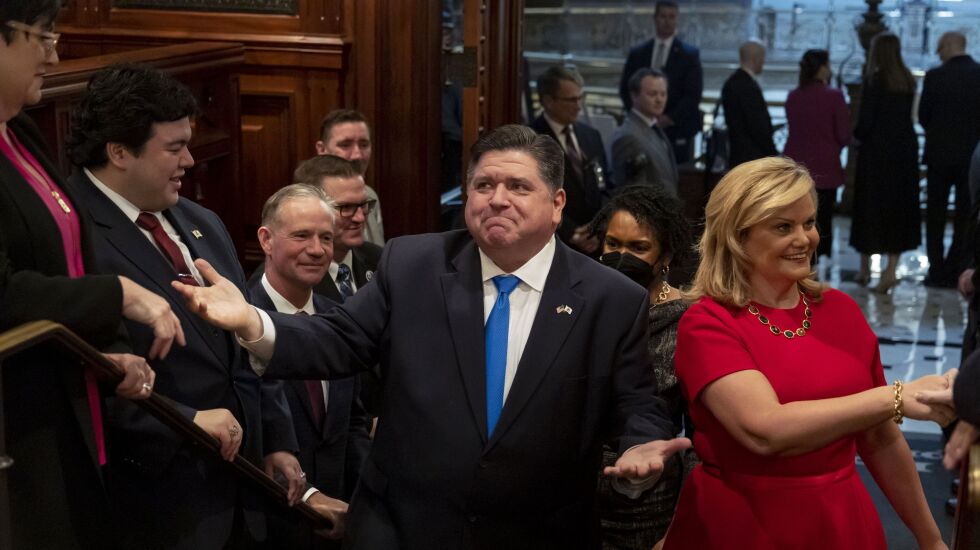
In this climate defined by fear-based attacks on diversity, equity and inclusion in our nation’s classrooms, I frequently experience frustration and sadness. As an educator, I have waited for elected leaders to take an affirmative stand and punch back.
Gov. J.B. Pritzker did just that in his State of the State speech last month.
“I’ve laid out a budget agenda that does everything possible to invest in the education of our children …” Pritzker said “Yet it’s all meaningless if we become a nation that bans books from school libraries about racism suffered by Roberto Clemente and Hank Aaron, and tells kids they can’t talk about being gay, and signals to Black and Brown people and Asian Americans and Jews and Muslims that our authentic stories can’t be told.”
SEND LETTERS TO: letters@suntimes.com. We want to hear from our readers. To be considered for publication, letters must include your full name, your neighborhood or hometown and a phone number for verification purposes. Letters should be a maximum of approximately 350 words.
As fake parents’ groups, egged on by Florida Gov. Ron DeSantis, take aim at children and families unable to defend themselves from stereotypes, threats, bullying and violence, Pritzker took the bold stance by acknowledging that children, including those of color, should be centered and celebrated for who they are.
Children need to know upon whose shoulders they stand.
We cannot talk about Dr. Martin Luther King Jr. or Rosa Parks without acknowledging their fights were rooted in their identities as African Americans. We cannot discuss Roberto Clemente’s death on a humanitarian mission to Nicaragua without discussing the poverty that wrecked the country because of a war instigated by the U.S. government. We cannot talk about the death of Harvey Milk without stating he was murdered for being a gay man.
Pritzker’s statement should not be revolutionary, but when the discourse is dictated by bad actors who do not hesitate to manufacture fear for a vote, it is critical that elected leaders plant a common sense flag. If a child does not feel safe, that child will not learn. If a child feels unseen, that child may struggle to learn and grow into the best adult they can be.
Allowing authentic stories to be told, allowing children to gain a deeper understanding of who they are, is the minimum. It’s time that elected officials elsewhere in the country follow Pritzker’s lead.
Gerardo Muñoz, 2021 Colorado State Teacher of the Year
How the media can better tackle corruption
Corruption scandals are a constant feature in the news, yet citizens rarely demand accountability from crooked politicians. Ultimately, the interpretations of facts and what newspapers and television stations choose to mention and leave out influences how the public reacts to the wrongdoing.
Insights from social psychology suggest that people become more receptive to a specific behavior if they perceive their peers as approving of it and less tolerant if they perceive their peers to be intolerant of it. If news reports emphasize successes instead of failures in the fight against corruption, along with the message that the vast majority of citizens do not tolerate corruption, it can encourage anti-corruption behavior.
But if the prevailing message is that of continual failures in fighting corruption, it whittles away at the motivation to eliminate corruption.
Additionally, news consumers are more likely to identify with victims if they are given specific details and names, rather than the consequences suffered by a large group.
Finally, people are more likely to be motivated to engage in anti-corruption behavior if media reports specify a detailed anti-corruption plan on how to get results. Outlining specific anti-corruption actions is crucial. If people do not know exactly what they need to do and are unaware there is an ongoing effort, they are likely to resort to denial.
Media outlets, including the Sun-Times, should consider these nuances in their efforts to fulfill their watchdog function, so corruption can be effectively rooted out.
Andris Zimelis, Ph.D, University of Illinois at Chicago
Reading the fine print
Why is it when the most rabid supporters of unregulated firearm ownership quote the Second Amendment, they never quote its beginning: “A well regulated Militia, being necessary to the security of a free state …?” Illinois Attorney General Kwame Raoul’s defense of the Illinois assault weapons ban should depend solely on the text of the Second Amendment.
To paraphrase the late Justice John Paul Stevens, by its own terms the Second Amendment, when read properly, the right to keep and bear arms does not apply to individuals outside of the militia context.
One day, after the vast majority of the country is sick and tired of hundreds of millions of unregulated firearms and the hundreds of thousands of avoidable deaths they enable, the Supreme Court will read the Second Amendment properly.
Bob Barth, Edgewater







